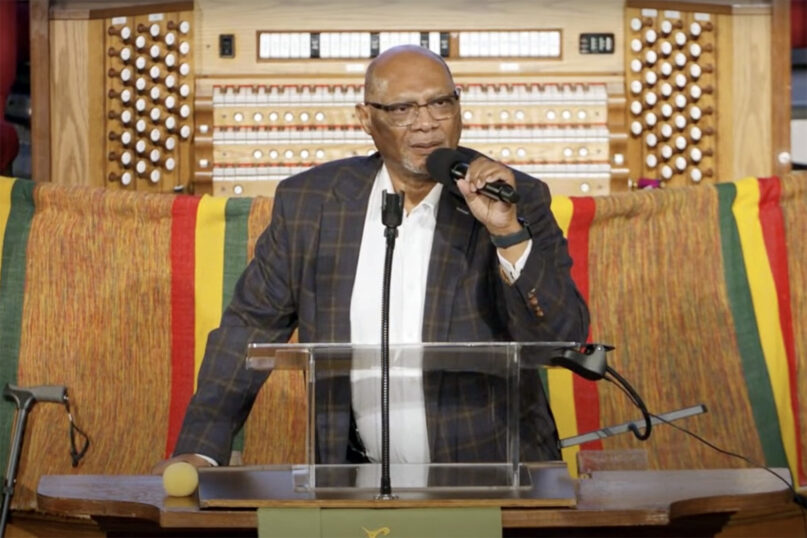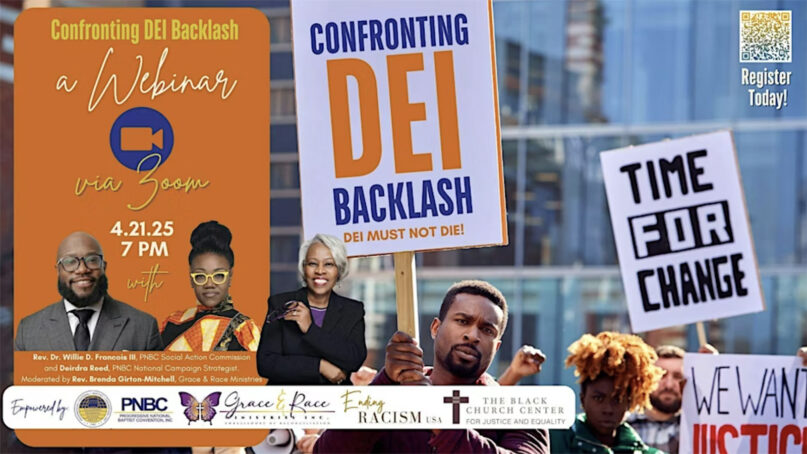(RNS) — A collective Lenten fast from making purchases at Target has been lengthened into a “full-out boycott,” the Rev. Jamal Bryant, pastor of an Atlanta-area megachurch and one of the leaders of the campaign, announced on Easter Sunday (April 20).
At a Tuesday town hall meeting, the pastor of New Birth Missionary Baptist Church said the big-box retailer continues to not take the concerns of Black shoppers seriously. Bryant said they are extending the Lenten campaign beyond Easter because Target had not met all of the campaign’s demands. Among them: restoring the company’s commitment to diversity, equity and inclusion principles and pledging money to Black-owned banks and businesses.
The Lenten fast, which garnered some 200,000 registrants on the targetfast.org website, was organized as a protest against Target’s announcement in January that it would pull back from DEI programs, including one dedicated to diversifying the suppliers it uses to stock its shelves. The announcement came days after President Donald Trump signed an executive order titled “Ending Radical And Wasteful Government DEI Programs And Preferencing.”
“None of these companies would think for a moment to do how they have handled us, what they do to the Jewish community,” Bryant said. “How they have handled us is not how they would handle the Asian community. They are doing it because they believe they can get away with it.”
Bryant said the Lenten campaign, whose start he credited to Minneapolis grassroots organizers, and now the boycott are meant as a reminder to Target of its promises to work on diversity, equity and inclusion after the death of George Floyd in Minneapolis, the location of the retailer’s headquarters.
RELATED: Boycotts accompany prayer as faith leaders prepare for a Lent of protest
“During the summer of 2020 when George Floyd was murdered in Minneapolis by a white police officer, Target claimed to have seen the light, but now, five years later, there seems to be a lunar eclipse,” said Bryant, whose church hosted a “Bullseye Black Market” on Easter weekend on its Lithonia, Georgia, campus to promote Black businesses, some of which have been featured in Target stores.

Bishop Reginald Jackson, chair of the African Methodist Episcopal Church’s Social Justice Commission, also called for a Lenten boycott of Target in February.
He said on Thursday he hopes to confer as soon as next week with Black faith leaders about what other collective actions they may join in to push back against corporations scaling down DEI policies. He said they will also discuss concerns about possible Trump administration changes to the Smithsonian’s National Museum of African American History and Culture. The president has signed an executive order “to restore the Smithsonian Institution to its rightful place as a symbol of inspiration and American greatness.”
Jackson added that he hopes to plan a Washington event with leaders of different faiths and races in July prior to Independence Day.
“This is not only a sociological matter; this is also a theological matter,” he said. “What is it that we really believe? What is it we are committed to? What are we willing to stand up for?”
In an April 17 statement, the Rev. Al Sharpton announced he “had a very constructive and candid meeting” with Target CEO Brian Cornell and would be determining next steps after consulting with other faith leaders. That meeting occurred two days after the civil rights activist met with executives of PepsiCo, a food and drink conglomerate that had updated a company webpage on Feb. 20 to describe an “Inclusion for Growth” strategy. Reuters said at that time the food and drink company ended an earlier five-year DEI strategy.
Retail Brew, a publication following the retail business, reported in early April that Target has seen decreases in foot traffic during the same period as the boycotts led by Bryant and others.
“While correlation — we’ll say it again — is not causation, note that Target’s traffic slump began in the first full week after it announced it was dismantling its diversity, equity, and inclusion (DEI) efforts,” the publication said in an April 7 report.
In a statement Wednesday, Target said, “we have an ongoing commitment to creating a welcoming environment for all team members, guests, and suppliers.”
“It’s core to how we support and grow our business,” the company said. “We remain focused on supporting organizations and creating opportunities for people in the 2,000 communities where we live and operate.”
A collaboration of Black church leaders held a “Confronting DEI Backlash” webinar on Monday. Dozens attended to learn about historical examples of reversals to racial progress and ways to counter them, including calling on political leaders and business executives to advance policies that provide fairness and equity.

A 16-page guide for participants included Target as a case study and listed “corporate DEI retrenchment” by other companies.
The Rev. Willie Dwayne Francois III is president of the Black Church Center for Justice and Equality, which co-created the guide and co-sponsored the webinar with the Progressive National Baptist Convention and other groups.
“We’re doing the work of informing the resistance so that it does complement what our siblings are doing in other spaces that are directly engaging the corporations,” he said.
The Associated Press contributed to this report.
RELATED: At King Day rally, Sharpton leads oath to support DEI as Trump opposes it
Original Source: